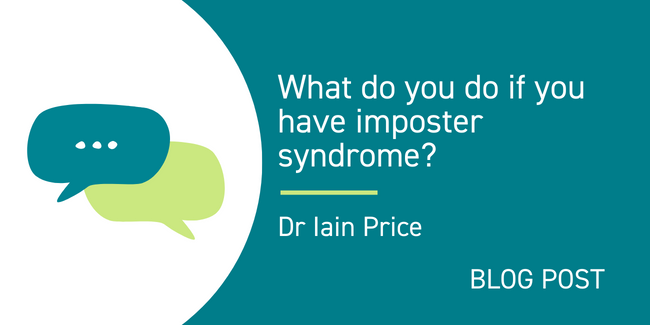The Perfectionist
The high goal setter; the competitor; the high self-expectations.

Dealing with imposter syndrome is all about dealing with that voice in your head. You know the one? “You’re going to mess this up”; “you really aren’t qualified to do this”; “you don’t deserve it”; “you’re going to be found out”. We all have this voice, this inner monologue. To be fair it is there to help protect you, to try and pull you back from the brink of success in case it leads you into mortal or social danger. The problem is that an over-zealous voice can become the inner dementor rather than the inner cheerleader. This leads to a plummet in self-confidence, which left unchecked, tends to stop your success and enjoyment of life dead in its tracks. Before you despair just know that, if this sounds familiar, you are not alone! Whether people admit it or not, recent research by YouGov suggests that most UK adults display at least three out of seven signs of imposter syndrome*, and international research suggests that those in clinical roles, particularly graduate clinical roles, are affected more so, up to 82% in some groups studied.** The first step in dealing with imposter syndrome is to admit it to the most important person – and that person is yourself. On balance, do you find yourself feeling like a failure, undeserving of success, crediting any successes you have to others or just luck? Remember this is not about judgement, this is about noticing and acknowledging your feelings and thoughts for what they are. The next step is to realise that imposter syndrome is only a common term from the 1970s for a condition that is usually temporary and / or related to a specific context. Other terms are more commonly used amongst coaches, trainers and therapists and that is imposterism. Imposterism recognises that these feelings and thoughts, this inner voice, are most likely not a result of a true syndrome or deficit. Rather it’s your brain trying to react to a situation in a way it feels will best serve you and keep you safe. Knowing that you are not alone and in good company, the next step is to identify the script that your imposterism voice tends to use. What are the things that your imposter tends to tell you? What do you think this voice is trying to protect you from? Most feelings of imposterism come from different personas that have served you well in the past. We can call these personnas ‘archetypes’. These are in part a result of who you are, which is also how you tend to think. They do mean well and often have a positive intent. For imposterism Dr Valerie Young refers to these as archetypes as:
The high goal setter; the competitor; the high self-expectations.
The work harders; the sacrificers.
The get it right first time; the play it safers if you can’t get it first time.
They show competence and value by not needing help from others.
The knowledge and experience are what matters; the collector of qualifications and accreditations.
Which archetype do you most relate to? What do think is its positive intent for you? What negative script/s does your imposter use to keep you to your imposter archetype? Now you are in a place to flip the negative script to something that is more positive. You can own the positives of your imposter by thanking the negative self-critical inner voice - literally by saying “thank you for your contribution” - and then have a positive ‘go-to’ script that you can use instead. “You’re going to make a mess of this” could become “Thank you. I might make mistakes but my high standards means I will learn from it and become even better”. “Your success is just lucky” could become “Thank you. I know how to recognise opportunities”. “You are only successful because of others” could become “Thank you. I can work well as part of a team”. Be warned this will take persistence and practice but you can do it. The key thing is you don’t need to suffer from imposterism and you certainly don’t need to face it alone. If you want to know more about how you can own and overcome your imposter do get in touch with Iain / VDS-Training directly to find out how. *YouGov. (2022). Impostor Syndrome Survey Results. Retrieved from https://d3nkl3psvxxpe9.cloudfront.net/documents/YouGov_-_Impostor_Syndrome_Survey_Results.pdf **Chrisman, S. M., et al. (2020). Prevalence, predictors, and treatment of impostor syndrome: A systematic review. Journal of Behavioral Science, 25(4), 123-145. https://www.ncbi.nlm.nih.gov/pmc/articles/PMC7174434/
About VDS Training
VDS Training are passionate about developing all members of the veterinary team, to help you overcome the personal and professional challenges you face on a daily basis, and to build practical skills and techniques to make a real difference to you and your life.